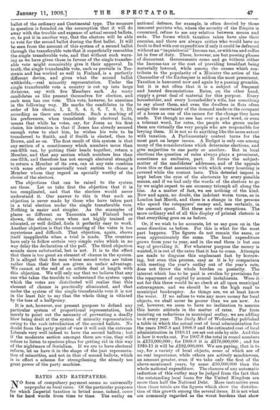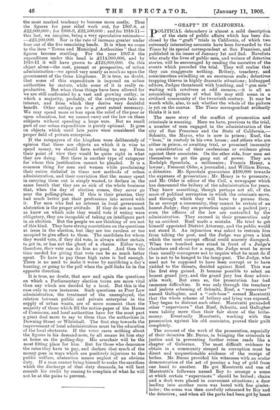RATES AND RATEPAYERS.
NO form of compulsory payment seems so universally unpopular as local rates. Of the particular purposes for which Ituperial taxation is levied some, indeed, come in for- hard words from titne to thne. The outlay on national defence, for example, is often decried by those innocent patriots who, where the security of the Empire is concerned, refuse to see any relation between means and ends. The forms which taxation takes have also their enemies, and there are always critics who would have no fault to find with our expenditure if only it could be defrayed without an "inquisitorial" Income-tax, or with tea and coffee let in free of duty. These, however, are but passing phases of discontent. Governments come and go without either the Income-tax or the cost of providing breakfast being materially lowered, while among the causes which con- tribute to the popularity of a Ministry the action of the Chancellor of the Exchequer is seldom the most prominent. Taxation is honoured now and again by a passing grumble, but it is not often that it is a subject of frequent and heated denunciations. Rates, on the other hand, supply a great deal of material for this purpose. Every householder, and every householder's wife, has something to say about them, and even the dwellers in flats often assign the uncertainty of the demand made on the occupant of a house as one of the causes for the change they have made. Yet though no one has ever a good word, or even a tolerant word, for rates, the people who groan under them are virtually the very people who are responsible for levying them. It is not so to anything like the same extent with taxation. A Parliamentary contest turns for the most part on larger issues. A Budget is only one among many of the considerations which determine elections, and give majorities to one party or another.. But in local elections the question of rates always plays a prominent, sometimes an exclusive, part. It forms the subject matter of the candidates' addresses, and of the appeals from this or that association with which every hoarding is covered while the contest lasts. This detested impost is kept before the eyes of the electorate by every possible means, and if we had only the words of the electors to go by we might expect to see economy triumph all along the line. As a, matter of fact, we see nothing of the kind. Now and again, no doubt, the indolent worm turns, as in London last March, and there is a change in the persons who spend the ratepayers' money and, less certainly, in the amount spent. But these are only exceptions. The more ordinary end of all this display of printed rhetoric is that everything goes on as before.
Or, if we wish to be accurate, let us say goes on in the same direction as before. For this is what for the most part happens. The figures do not remain the same, or even approximately the same. The local expenditure grows from year to year, and in the end there is but one way of providing it. For whatever purpose the money is wanted, it is out of the rates that it has to come. Attempts are made to disguise this unpleasant fact by borrow- ing, but even this process, easy as it is by comparison with meeting the year's outlay out of the year's rate, does not throw the whole burden on posterity. The interest which has to be paid is swollen by provisions for the repayment of capital by annual instalments. Were it • not for this there would be no check at all upon municipal extravagance, and we should be on the high road to municipal bankruptcy. As things are, we at least know the worst. If we refuse to vote any more money for local objects, we shall never be poorer than we are now. As yet, however, we seem to have no inclination to assume this heroic attitude in the matter of rates. Far from insisting on reductions in municipal outlay, we are adding to it every year. The Daily Mail of Wednesday published a table in which the actual cost of local administration for the years 1907-8 and 1908-9 and the estimated cost of local administration in 1910-11 are set out side by side. And this is how it works out. For 1907-8 the total in round numbers is £173,000,000; for 1908-9 it is £176,000,000; and for 1910-11 it will be £182,000,000. We are paying, that is to . say, for a variety of local objects, some of which are of no real importance, while others are actively mischievous, an amount greater, even if we take only the first of the above-mentioned years, by some £50,000,000 than the whole national expenditure. The chances of any automatic reduction of this outlay may be judged from the fact that the outstanding local loans for the -United Kingdom are more than half the National Debt. More instructive even than these totals are the figures which show the distribu- tion of this growth among the several items. It is not what are commonly regarded as the worst burdens that show the most marked tendency to become more costly. Thus the figures for poor relief work out, for 1907-8, at £22,000,000; for 1908-9, £22,500,000; and for 1910-11— this last, we imagine, being a very speculative estimate- -.223,200,000. Nor is the rate of increase greater under four out of the five remaining heads. It is when we come to the item "Towns and Municipal Authorities" that the figures become startling. For the year 1907-8 the expenditure under this head is £114,000,000, and by 1910-11 it will have grown to £123,000,000. On this object alone—the cost, present or prospective, of urban administration—we spend very nearly as much as upon the government of the three kingdoms. It is true, no doubt, that some of this expenditure is imposed on urban authorities by statute, while some of it is really re- productive. But when these things have been allowed for we are still confronted by a vast and growing outlay, in which a majority, probably, of the ratepayers take no interest, and from which they derive very doubtful benefit. Other outlays are to a great extent necessary. We may spend more or less upon the relief of the poor or upon education, but we cannot carry out the law on these subjects without spending a large sum. But no small part of our urban expenditure is purely optional. It goes on objects which until late years were considered the proper field of private enterprise.
• If the ratepayers of the kingdom were deliberately of opinion that these are objects on which it is wise to spend money, we should have nothing to say. From their point of view they would be quite right in what they are doing. But there is another type of ratepayer for whom this justification cannot be pleaded. It is a, common thing for men and women while proclaiming their entire disbelief in these new methods of urban administration, and their conviction that the money spent in carrying them out is simply wasted, to declare in the same breath that they are so sick of the whole business that, when the day of election comes, they never go near the polling-places. If this is their practice, they had much better put their professions into accord with it. For men who feel no interest in local government abstention is the proper attitude. If they do not so much as know on which side they would vote if voting were obligatory, they are incapable of taking an intelligent part in an election. But the people we are thinking of are not of this kind. They have strong convictions on the questions at issue in the election, but they are too careless or too occupied to give effect to them. The candidate for whom they would vote, if they did vote, is always either certain to get in, or has not the ghost of a chance. Either way, therefore, their vote can do him no good. And then the time needed for giving that vote can be so much better spent. To have to pay these high rates is bad enough. There is no need to make it worse by sacrificing a day's bunting, or going to the poll when the golf-links lie in the opposite direction.
It is true, no doubt, that now and again the questions on which a Parliamentary election turns are more vital than any which are decided by a local. But this is the case only in rare instances. Such questions as Poor Law administration, the treatment of the unemployed, the relation between public and private enterprise in the supply of urban wants, are of more moment than the majority of those which fill the notice-paper of the House of Commons, and local authorities have for the most part a great deal more to say to them than the authorities in Downing Street or Whitehall. The first step towards the improvement of local administration must be the education of the local electorate. If the voter cares nothing about the figures in his demand-note, by all means let him stay at home on the polling-day. His armchair will be the most fitting place for him. But for those who denounce the rates they have to pay, and declare that much of the money goes in ways which are positively injurious to the public welfare, abstention means neglect of an obvious duty. If a man cannot bring himself to make the sacrifices which the discharge of that duty demands, he will best consult his credit by ceasing to complain of what he will not be at the pains to prevent.











































 Previous page
Previous page